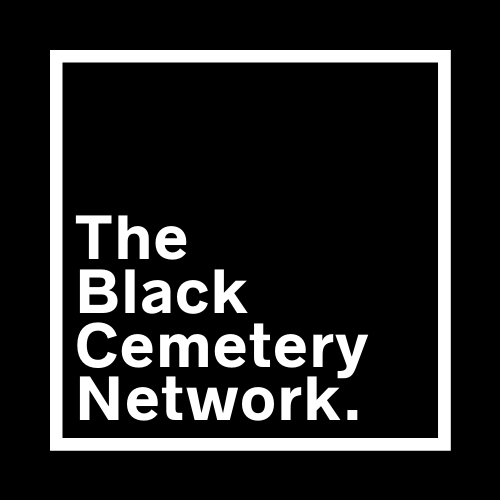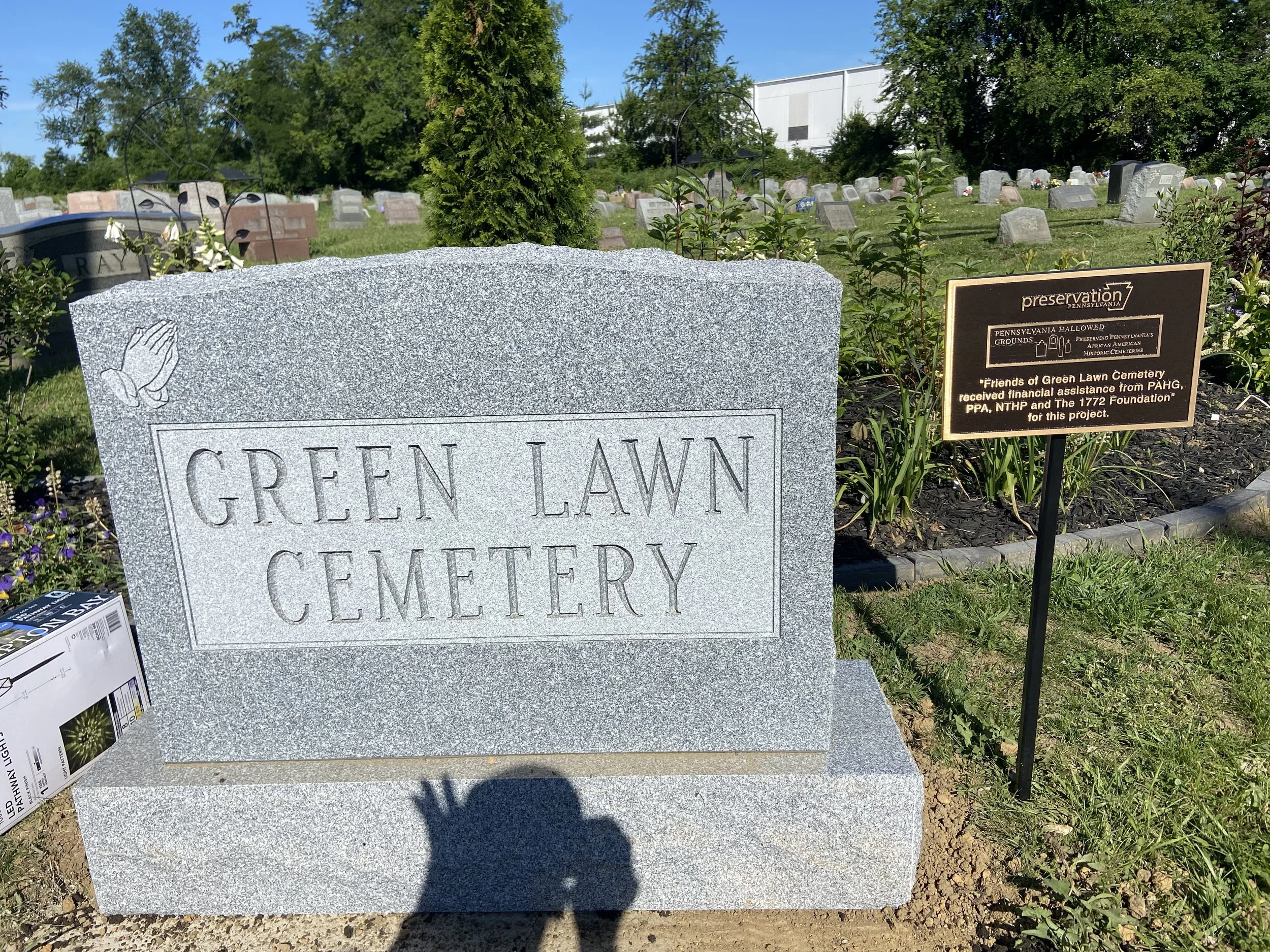SITE DIRECTORY
To learn more about any of the BCN sites listed below, click “Read more” to view individual site briefs. To search for a specific BCN site, use the search bar below:
Green Lawn Cemetery
GREEN LAWN CEMETERY
FOUNDED: 1907
ADDITONAL NAMES: N/A
AFFILIATION(S): N/A
HISTORY:
Green Lawn Cemetery was founded by a former enslaved person, Lawrence Murray, Sr., in May 1907 to serve the African American community in the City of Chester, Delaware County, Pennsylvania. African Americans were not allowed to be buried within the Chester City limits. The 8.5-acre cemetery houses approximately 2,000 burials, including the graves of at least 300 veterans of the United States Armed Services who served from the Civil War through the 20th century. Green Lawn is a vital cultural and historical resource in the community, where residents can connect and learn about African American history and life, as well as the significant contributions African Americans have made to the Chester area, the Commonwealth of Pennsylvania, and the nation.
BCN Contact Information:
Dr. Clarence "AL" Grasty
Mother Archie's Cemetery
MOTHER ARCHIE’S CEMETERY
FOUNDED: 1891
ADDITONAL NAMES: N/A
AFFILIATION(S): N/A
HISTORY:
Mother Archie’s cemetery is located in Chadds Ford Township in Delaware County, Pennsylvania. The cemetery sits just next to the remains of what was formerly the Bullock Octagonal School (1838). In 1891, Lydia A. Archie, a Black woman and oldest ordained female Preacher in the African Union M.P. Church, purchased the property. Lydia Archie, or Mother Archie as she was often referred as, used the building as a church and the adjacent ground as a cemetery. Her congregation met regularly in the old schoolhouse until her death in 1932.
The cemetery is the final resting place of seventy-nine members of the church, including Mother Archie herself. While less than half of the gravestones remain, it is the hope of Chadds Ford Township, who obtained the property in 1954, that the remaining gravestones can be cleaned and preserved. Mother Archie, who also built and lived in a home on the same property as her church and cemetery, was a pillar of Chadds Ford’s black community from 1891-1932. After her death, the church and cemetery became inactive as Mother Archie’s children and congregation moved on and passed away.
However, both the cemetery and remains of the church continue to captivate and inspire. Andrew Wyeth was a frequent visitor of Mother Archie’s in the 1950s and painted several images of the ruins. Although Mother Archie and her congregation have left, it is the hope of the Township to preserve what Mother Archie created and celebrate the lives of those buried there.
BCN Contact Information:
Chadds Ford Township
info@chaddsfordpa.gov
Eden Cemetery
EDEN CEMETERY
FOUNDED: 1902
ADDITONAL NAMES: Historic Eden Cemetery
AFFILIATION(S):
Pennsylvania Hallowed Grounds
HISTORY:
The creation of the Eden Cemetery Company was a collaborative effort to provide a sanctuary in the Philadelphia area where African Americans could be buried with dignity and respect. Founded at the height of Jim Crow, six years after Plessy v. Ferguson, Eden Cemetery was Philadelphia's African American answer to a burial crisis created in the community, due to segregation, urban expansion, public works projects, vandelism, condemnation, and the closure of earlier Black burial grounds and cemeteries. Having a dignified place for burial was a long-standing challenge to African Americans due to racism, but by the end of the 19th century the situation in Philadelphia grew even more dire with the closures of Lebanon and Olive cemeteries and the enactment of municipal ordinances that in effect prohibited the creation of new African American cemeteries within City limits.
Opened in 1902, Eden represented African American agency to address these problems by establishing a new cemetery in suburban Delaware County on fifty-three acres that were part of Bartram Farm, and as a "collection cemetery" for dislocated earlier black burial grounds and cemeteries. This move was not fraught without challenges. On August 12, 1902, Collingdale's white residents blocked the entrance to the cemetery, protesting "a colored burial ground" in their community. Authorities of the borough delayed the funeral for hours. The Delaware County community protested against its opening with a court injunction. The headline in the August 13th, Chester County Times read: "Collingdale Has More Race Troubles, Town Council Has No Use for a Colored Funeral, No African Need Apply." When a compromise was finally reached, Eden was able to have its first burial on August 14, 1902.
The cemetery quickly became a beacon of community pride and representation of African American heritage through the designation of its cemetery sections. An example of this is the John Brown section, which became the chosen resting place for many United States Colored Troops and Frances Ellen Watkins Harper, a Citzen of Eden, who viewed John Brown as an important friend and hero.
Since its beginning, Eden has been a steward of the history and culture of a people, of communities made invisible,. A legavy cemetery, Eden is comprised of dislocated burial grounds, churchyards and cemeteries with over 90,000 persons entrusted to its care. The lives of the Citizens of Eden span from 1721 to the present. Monuments throughout the cemetery eternally memorialize the lives of many thousands, who are an important part of history, and the communities that they represent.
Historic Eden offers a unique cultural, educational, and historical resource in the Greater Philadelphia, Delaware Valley, and the Southeastern Pennsylvania area. The past, present, and future converge at Eden, reflecting a broad spectrum of American history, heritage, culture and memory. Eden offers tours and events designed to educate and connect the past with the present and the future.
Today, Eden is an exceptional monument to the national African American civil rights story. Historic Eden Cemetery is listed in the National Register of Historic Places, is a part of the National Park Service Underground Railroad to Network to Freedom, a member of the Pennsylvania Hallowed Grounds and a member of the Association for the Study of African American Life and History.
Eden looks to the future with a continued focus on stewardship and service, with a strong consideration of how the cemetery will adapt to the ever-changing needs of the community, so that Eden can continue to preserve memory and to provide stewardship and service well into the next century.
BCN Contact Information:
Eden Cemetery
info@edencemetery.org
Spring Valley AME Church and cemetery
SPRING VALLEY AME CHURCH AND CEMETERY
FOUNDED: 1880
ADDITONAL NAMES: N/A
AFFILIATION(S): N/A
HISTORY:
Spring Valley AME is a small church once affiliated with Mother Bethel AME. Located in Concord Ville (Glen Mills) Delaware County PA. The exterior has been renovated & a grave marker placed for those buried there. The AME Church is listed on the Concord Township Historic Resources Inventory as Resource #132, and as such is covered under the Concord Township Historic Preservation Ordinance. The church is a Class 2, meaning it is historically significant to the local history, being the only black church in the township.
Well-known African American Concord Ville soldier and patriot, James T. Byrd, born March 10, 1905 and passed away on May 8, 1985, was a member of Spring Valley AME Church. He is buried in what was called the “colored people’s” cemetery. James Byrd was the father of Betty Byrd Smith (a civil rights activist) and Thomas Byrd.
BCN Contact Information:
Concord Township Historical Society
https://concordhist.org/about-the-society/
610-459-8556





